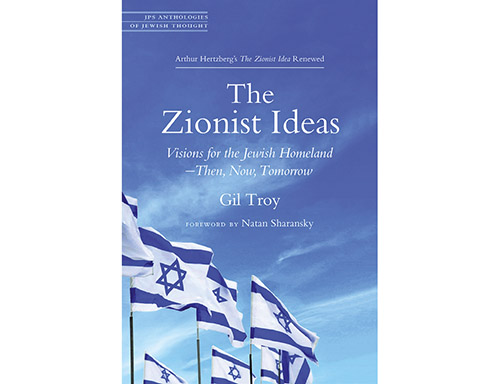
Reviewing: “The Zionist Ideas: Visions for the Jewish Homeland—Then, Now, Tomorrow,” by Gil Troy, Ed. Jewish Publication Society. 2018. English. Paperback. 608 pages. ISBN-13: 978-0827612556.
Another book on Zionism? Well, yes.
In 1959, Arthur Hertzberg a leading historian, rabbi and Zionist leader, published “The Zionist Idea,” an anthology of writings by the foremost theorists of the Zionist movement, including Theodor Herzl, Ahad Ha-Am, Martin Buber, Louis Brandeis, Rabbi Abraham Isaac Kook, Judah Magnes, Max Nordau, Mordecai Kaplan, Ze’ev (Vladimir) Jabotinsky, Chaim Weizmann and David Ben-Gurion. This became the classic Zionist anthology in English, which scholars and laymen read and quoted widely.
Gil Troy, an award-winning American presidential historian and a prominent Zionist activist, took on the task of updating this vital resource with great success. As a scholar, he wants his readers to appreciate the historical origins of Zionism, the context in which it developed, its accomplishments, the challenges Zionism faced from the outset and during its formative years, as well as the issues it confronts today and in the future. As a Zionist activist and educator, Troy wants Jews and non-Jews concerned about the future of the Jewish people “to join this rousing conversation about this grand Jewish experiment.” Now that Zionism has achieved its initial objective of being a refuge for the Jewish people, he asks supporters of Israel to join together with him to ensure the country will achieve its “full potential as an old-new-dreamland: a model Jewish democracy.”
To reach this goal, Troy has assembled a collection of the writings of more than 170 Jewish academics, philosophers, theorists, rabbis, “torchbearers” and “visionaries.” To understand the sheer magnitude and the breadth of this treasure, one must note some of the names of those who have contributed to this volume.
In part one (pre-1948), the pioneers who founded the Jewish state include Herzl, A.D. Gordon, Jabotinsky, Rabbi Zvi Yehuda Hacohen Kook, Ha’am, Solomon Schechter, Hayyim Nachman Bialik, Meir Bar-Ilan, Louis Dembitz Brandeis and Henrietta Szold Part two (1948 to 2000) features builders who actualized and modernized the Zionist blueprints, such as Ben-Gurion, Moshe Shamir, Golda Meir, Abba Eban, Shimon Peres, Chaim Herzog, Stephen S. Wise, Menachem Begin, Joseph Ber Soloveitchik, Leon Uris, Mordecai Kaplan, Abraham Joshua Heschel, Eliezer Berkovits, Yitzhak Rabin, Benjamin Netanyahu, Amos Oz, Elie Wiesel, Herman Wouk and Nathan Sharansky.
Today’s torchbearers include Ahron Barak, David Grossman, Ayelet Shaked, Ze’ev B. “Benny” Begin, Benjamin “Benny” Lau, Yossi Beilin, A.B. Yehoshua, Michael Oren, Daniel Gordis, Rabbi Lord Jonathan Sacks, zt”l, Irving “Yitz” Greenberg, Yehuda Amital, David Ellenson, Arnold Eisen, Yedidia Stern, Daniel Polisar, Adam Milstein, Ronen Shoval, Reuven Rivlin, Yair Lapid, Ruth Wisse, Caroline Glick, Alan Dershowitz, Yoram Hazony, David Mamet, Shmuel Triango, Saul Singer, Ruth Gavison, Anita Shapira, Peter Beinart, Chaim Gans and Einat Wilf.
A Final Note
The enormous importance of Israel cannot be underestimated, observed Rabbi Sacks, whom Troy quotes. Sacks declared: “The role of Israel in an era of continuity is not the same as in an era of survival.” Starting with the fundamental Zionist assumption—“Jewish life cannot be sustained without Israel at its core”—Sacks claimed: “Once Israel saved Jews. In the future, it will save Judaism.” Furthermore, “Only in Israel can Jews live Judaism in anything other than an edited edition,” observed Israeli novelist, essayist and playwright Avraham Gabriel Yehoshua, who called Israel the Diaspora’s insurance policy.
Dr. Alex Grobman is the senior resident scholar at the John C. Danforth Society, a member of the Council of Scholars for Peace in the Middle East and on the advisory board of the National Christian Leadership Conference of Israel (NCLCI). He has an MA and PhD in contemporary Jewish history from The Hebrew University of Jerusalem.









